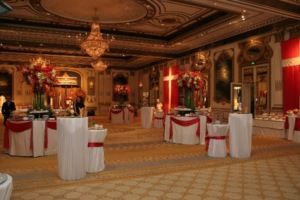Business & Education
The oriental Dane who founded an Oriental chain
This article is more than 9 years old.
What started as a home for seamen came to be one of the world’s most luxurious hotels thanks to a Dane

The Oriental celebrated the 150th anniversary of diplomatic relations between Denmark and Thailand last year with a diplomatic function on the occasion of Queen Margrethe’s birthday. Against a backdrop of Danish flags and an ice sculpture of the Little Mermaid, Thai, Danish and EU dignitaries were invited to sample Danish specialties – including hotdogs, herring and liver paste (photo: The Oriental)
It’s said that good businessmen never pass up an opportunity to make a buck.
So when Hans Niels Andersen, a 29-year-old Dane, checked into a modest seamen’s mission in Bangkok in 1881, he quickly identified the need for a more respectable place of lodging, with good accommodation, a bar and a western menu that would appeal to the ever-growing number of travellers and businessmen attracted to the fast-growing Thai market.
Within weeks, the seamen’s mission was his, and the foundations were laid for what was to become one of the world’s leading luxury hotels: The Oriental, Bangkok.
By the second-half of the 19th century, grand luxurious hotels had sprung up along the booming shipping routes of Asia, such as Raffles in Singapore, the Eastern & Oriental in Penang and the refined Hong Kong Hotel, to meet the ever-growing demands of western businessmen and Andersen had seen them all on his travels through the region in search of goods to export to Denmark and Europe.
Siam, as Thailand was then known, had been fiercely resistant to colonial expansion, but by 1862 was opening up to the West and the very first incarnation of The Oriental, referred to in local papers only as a ‘boarding house for seafarers’, was established on the banks of Bangkok’s Chao Phraya River, ‘the mighty mother of all waters’ – only to burn down in 1865.
Hans down, a good deal
In 1875, the Oriental was rebuilt by two Danish sea captains, C Salje and H Jarck, but the hotel never rose above its ‘seaman’s mission’ status, and when the two expressed a desire to return to Denmark in 1881, Andersen, who had made his money, and reputation, by sailing a cargo of teak to England against the monsoon and returning with a shipload of coal, jumped at the chance to buy them out.
With the aim of creating a building that would match the grand hotels he had experienced on his travels throughout Asia, Andersen hired top Italian architect S Cardu to transform the drab seamen’s mission into the very first luxury hotel in Siam. Cardu responded with a structure and opulence never seen outside the nearby Royal Palace, with halls and bedrooms furnished with carpets from Persia, wallpaper from France and mahogany rattan furniture from Burma – and a second storey, something unheard of in a country of floating houses and wooden bungalows.
After six years of construction, the building was finished and the Oriental Hotel threw open its doors on 19 May 1887 – the very same structure that remains at the heart of the hotel to this day and is now known as the Authors’ Wing.
Kings and future Tsars
The next six years were boom-time for The Oriental. As a master of self-promotion, Andersen hosted a grand banquet on 24 May 1888 to celebrate the Golden Jubilee of Queen Victoria – an event that garnered so much publicity that The Oriental became known as the place for every important party and event in Bangkok. His Majesty King Chulalongkorn was so impressed with the facilities that he gave it the royal seal of approval and housed Crown Prince Nicholas of Russia, later to become tsar, there in 1891, the first of many royal guests to stay at The Oriental.
With 40 guest rooms, a restaurant, elegant reading and smoking rooms, and a bar well-stocked with French wines and European beers (primarily Carlsberg of course), The Oriental went from strength to strength, but by 1893, with Siam under the threat of annexation by France, and French warships anchored on the river directly outside the hotel, the ambitious Hans Niels Andersen decided to sell up. After receiving 22,000 US dollars for the hotel, ‘lock, stock and barrel’, he returned to Denmark to found the East Asiatic Company, which would later become one of the world’s leading shipping and cargo lines.
Today, the 376-room award-winning ‘grand old dame’ still sits regally on the banks of the Chao Phraya as part of the Mandarin Oriental Hotel Group’s 41 hotels worldwide, including 10,000 rooms in 27 countries across four continents.
It’s come a long way since Hans Niels Andersen checked into the seaman’s mission 138 years ago.










































